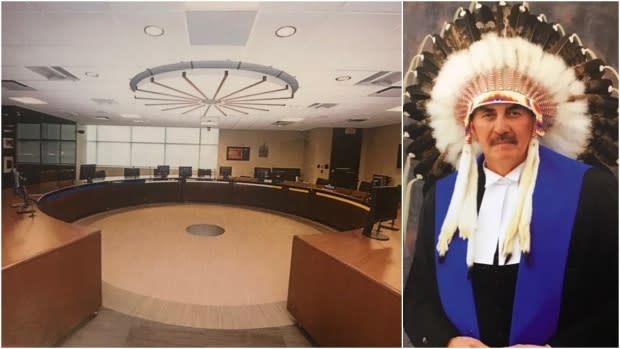'We don't have a word for crime': New Calgary Indigenous Court to follow peacemaking approach
The Calgary Indigenous Court (CIC) will officially open this week during a ceremony presided over by Judge Eugene Creighton, a member of the Blood Tribe who speaks fluent Blackfoot.
After about 18 months of planning, the court will open Wednesday. Sitting weekly, it will deal primarily with bail and sentencing hearings, focussing on a restorative justice approach to crime through peacemaking and connecting accused people to their cultures and communities.
Creighton, one of many who helped design and implement the court, attended nine years of residential school and has worked in the justice system as a correctional officer, probation officer, lawyer and now judge. He says the current system of justice and the criminal code itself are not effective in dealing with crime involving Indigenous people and do not honour First Nations' traditions
"We don't have a word for crime," said Creighton of the Blackfoot language. "Our word is mistake."
"How do you fix that, how do you correct that, how do you reconcile … there's ways of restoring relationships, there's ways of dealing with transgressions or transgressors."

Special courtroom
Every Wednesday, bail and sentencing hearings will take place in courtroom 1800, a space designed to support an Indigenous approach to law.
Modelled after a teepee, the courtroom will have participants sitting in a circle and at the same level. There is an eagle feather for oaths and special ventilation to allow for burning sweetgrass.
Four judges will preside over the court, two are Indigenous and two have deep connections to First Nations communities in Alberta.
The assigned prosecutor will also be Indigenous.
Provincial court Judge Joanne Durant came up with the idea for CIC which involved consultation with communities and stakeholders.
'We all want the same things'
Indigenous people are grossly over-represented in the justice system — making up less than five per cent of the Canadian adult population, they account for about 30 per cent of incarcerated adults, according to recent statistics.
The CIC is an effort to address those numbers and to implement recommendations from the Truth and Reconciliation Commission as well as the Missing and Murdered Indigenous Women and Girls (MMIWG) report.
"We all want the same things, we all want success, we all want good health, we all want economic development, we all want justice, we all want a safe community," says Leonard Bastien, a traditional knowledge keeper from the Piikani First Nation.
There is no new funding going into CIC, rather resources have been shuffled around in order to create the court and agencies have stepped in with additional supports.
Bail, healing plans
About a dozen agencies are in place to offer workers, supports and programs including help with housing, employment readiness, parenting, mental health, addiction and crisis interventions.
That will help achieve one of the goals of the court which is to, where appropriate, increase an accused person's chances of being granted bail.
Agencies include the Elizabeth Fry and John Howard Societies, Native Counselling Services, Aboriginal Friendship Centre, Homefront and the Calgary Police Service.
Native Counselling Services will work at the Calgary Remand Centre helping participants with bail plans and healing plans.
Sentencings will include a healing plan for the offender with Indigenous cultural activities, ceremonies and elders, or traditional knowledge keepers as they're more commonly known as today.
In certain cases, the court will also consider alternatives to jail and prison sentences.

